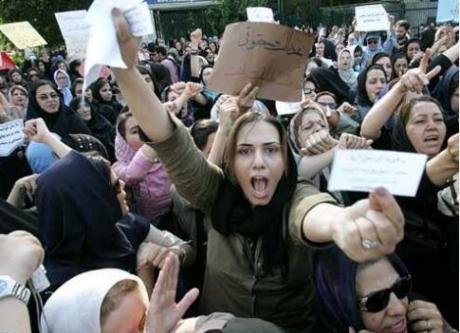
It is nearly impossible to read any article about Iranian women and not spend the entire time rolling your eyes. Historically, the Western media has tended to make liberal use of Orientalist and infantilizing depictions of Iranian women as, alternatively, trapped in the harems of their turbaned overseers (a historically pre-1979 trope applied liberally to all Middle Eastern women) or militantly crazed and clad in black “traditional garb” (a post-1979 trope specific to Iranian, and later Islamist, women).
Since 9/11, meanwhile, these depictions have become increasingly politicized within the War on Terror “white men saving brown women from brown men” paradigm (so brilliantly identified by Gayatri Spivak & explored by, among others, Saba Mahmood & Lila Abu Lughod). Despite the increase in rightwing rhetoric calling for war on Iran, however, the charge that Iranian women are mistreated and must be saved (like their Afghan sisters, as NATO and some neo-colonial minded collaborators at Amnesty International would have you believe) has not quite caught on.
The recent controversy over the Iranian women “ninjas” offers some insight into why it has thus far been quite difficult to convince Americans of the need to save Iranian women. On 2 February, Press TV ran a clip describing the increasing popularity of ninjutsu, a Japanese martial art, among Iranian women in a dojo in Karaj, a Tehran suburb. Reuters subsequently ran a story on the video with the headline, “Thousands of Female Ninjas train as Iran’s Assassins,” and on 18 February, the Telegraph ran a story entitled, “Iran trains ninjas as potential assassins,” one of many other news outlets that wrote pieces about a secret army of Iranian women ninjas that were being trained for war. Of course, this was all utter nonsense, though few of the agencies- besides Reuters- bothered to correct their mistakes.
As it became clearer that the ninja army angle was failing, other sites began to take a nominally feminist stance. The Guardian ran a piece discussing how the ninjas were “fighting for sexual equality,” and the Atlantic came out with an article that answered the question of “Why thousands of Iranian women are training to be ninjas” with: “In a society that treats them like children, sports — and especially martial arts — offer a way to express strength and independence,” proceeding to detail how marginalized Iranian women are in the Iranian public sphere, where their participation is “arduous and painful.”
The Iranian women “ninjas” themselves, sufficiently pissed off at Reuters for starting this whole insulting mess, subsequently sued the agency for defamation.
So what the hell happened?
An Iranian channel ran a story about how a certain kind of martial arts is enjoying increasing popularity among Iranian women. This means that a) Iranian women have rights, b) Iranian women can access the public sphere, c) Iranian women participate in organized, public sports, and d) an Iranian government news channel has no problem with any of this.
Faced with these facts, the Western media panicked: some news agencies resorted to the stereotype of Iranian women as veiled, militant fanatics; others opted for infantilizing portrayals of suffering women using martial arts as their only escape. Can you imagine any self-respecting Western reporter writing a story that explained, unprovoked, the popularity of karate among girls in suburban Los Angeles by citing America’s high rates of sexual assault? Additionally, few bothered to mention that recently it has been Western sports organizations that have prevented Iranian women from playing, for example in 2011 forcing the Iranian women’s soccer team to forfeit hope of reaching the Olympics because they wore sports hijabs on the field.
To understand the wild and sloppy reactions of Western journalists- even sympathetic ones- to a banal story about karate in Iran, it is useful to examine the history of women’s rights in Iran before and after the Revolution and the quite complicated roles secularization and Islamization had in both oppressing and liberating distinct strata of Iranian women.
For the entire article, please visit:






